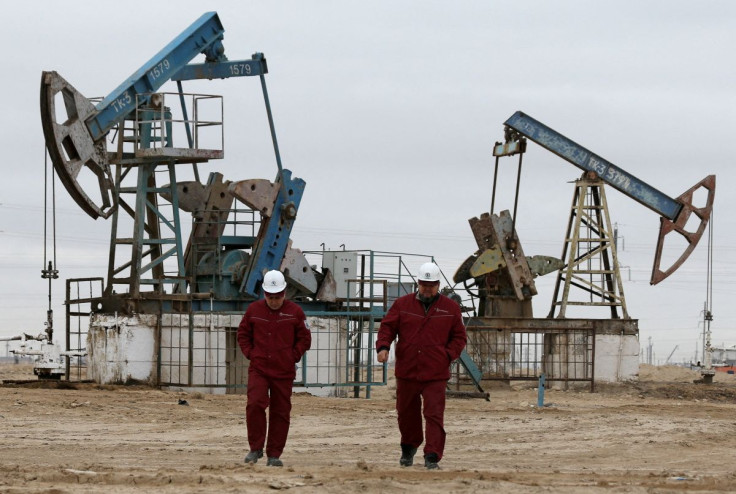Oil Jumps As Russia Gas Flow To Europe Falls, EU Russian Oil Ban Looms

Oil prices jumped almost 5% on Wednesday after plunging nearly 10% in the last two sessions, buoyed by supply concerns as flows of Russian gas to Europe fell and the European Union worked on gaining support for a Russian oil embargo.
Russian gas flows to Europe via Ukraine fell by a quarter on Wednesday after Kyiv halted use of a major transit route blaming interference by occupying Russian forces. It was the first time exports via Ukraine have been disrupted since the invasion.
Brent crude rose $4.59 to $107.05 a barrel by 11:13 a.m. EDT (1543 GMT). U.S. West Texas Intermediate crude climbed $5.02 to $104.78.
"I suspect the gas disruptions in Ukraine are having a steadily increasing impact," said Jeffrey Halley, analyst at brokerage OANDA.
The EU has proposed an embargo on Russian oil, which analysts say would further tighten the market and shift trade flows. A vote, which needs unanimous support, has been delayed as Hungary has dug in its heels in opposition.
"I expect that prices are going to continue to move on up especially if the European Union comes to an agreement to phase out Russian oil purchases over the balance of this year," said Andrew Lipow, president of Lipow Oil Associates in Houston.
U.S. crude stocks rose by more than 8 million barrels in the most recent week, due to another large release from strategic reserves, the Energy Information Administration said. Commercial crude inventories have been growing as the White House has elected to flood the market with oil to offset the rise in prices.
However, fuel prices have kept rising on the decline in refining capacity and surging demand for products worldwide - just as Russia's exports have been curtailed. That has driven refining margins to near-record levels in the United States. Despite the build in crude stocks, gasoline inventories fell by 3.6 million barrels in the latest week. [EIA/S]
"These draws are occurring across products - we are seeing refiners not able to keep up with demand for gasoline," said Tony Headrick, energy market analyst at CHS Hedging.
Oil was also supported by hopes of Chinese economic stimulus, after China's factory-gate inflation eased and investors took comfort in signs of lower domestic COVID-19 infections.
The price of crude has surged in 2022 as Russia's invasion of Ukraine added to supply concerns, with Brent reaching $139, the highest since 2008, in March. Worries about growth caused by China's COVID curbs and U.S. interest rate hikes have prompted this week's slump.
A backdrop of tight supply because of what major producers say is partly a result of inadequate investment remains supportive for oil. The United Arab Emirates energy minister highlighted these concerns on Tuesday.
© Copyright Thomson Reuters 2024. All rights reserved.


















